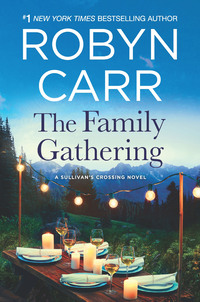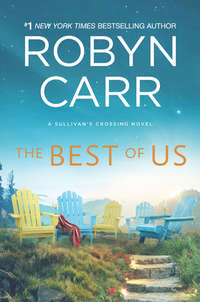
Полная версия
A Virgin River Christmas
“So did I,” Jack said. “Did twenty. What was your husband’s name?”
“Bobby Sullivan. Robert Wilson Sullivan. Any chance …?”
“I don’t recall a Bobby Sullivan or an Ian Buchanan. Got a picture of your husband?”
She reached into her vest pocket and pulled out a wallet, flipped it open and turned it to face Jack. There were several pictures in the clear plastic sleeves. She ate while Jack flipped through—the nineteen-year-olds’ wedding picture, Bobby’s official Marine Corps portrait—a fine-looking young man, a beautiful man. There were a couple of casual shots showing off his strong profile, powerful shoulders and arms, and then the last one—Bobby, almost unrecognizable, thin, gaunt, pale, eyes open but unfocused, in a raised hospital bed, Marcie sitting beside him, cradling his head against her shoulder, smiling.
Jack lifted his gaze from the pictures and looked at her solemnly. She put the spoon in the chili and patted her lips with the napkin. “He went over to Iraq in the first wave,” she said. “He was twenty-two. Twenty-three when he was wounded. Spinal cord injury and brain damage. He spent over three years like that.”
“Aw, kid,” Jack said, his strong voice weak. “Must’a been awful hard …”
She blinked a few times, but her eyes didn’t tear up. Yeah, there were times it was terrible, times it was heartbreaking, even times she resented the hell out of what the Marine Corps left her to deal with at her young age. There were also times she’d lie beside him in bed, pull him into her arms, press her lips against his cheek and just hold them there, remembering. “Yeah, sometimes,” she answered. “We got by. There was a lot of support. My family and his family. I wasn’t in it all alone.” She swallowed. “He didn’t seem to be in pain.”
“When did he pass?” Jack asked.
“Almost a year ago, right before Christmas. Quietly. Very quietly.”
“My condolences,” Jack said.
“Thank you. He served with Ian. Ian was his sergeant. Bobby loved him. He wrote me about him all the time, called him the best sergeant in the Corps. They became good friends almost right away. Ian was the kind of leader who was right in it with his men. Bobby was so happy that Ian turned out to be from our hometown. They were going to be pals forever, long after they were out of the Corps.”
“I went to Iraq right away, too. Went the first time, too. I was probably there at the same time. Fallujah.”
“Hmm. That’s where it happened.”
Jack shook his head. “I’m so goddamn sorry.” Jack slid the wallet back. “That why you’re looking for Buchanan? To tell him?”
“He might already know—I wrote to him a lot. Care of general delivery in Fortuna. The letters didn’t come back, so I assume he picked them up.”
Jack’s brow wrinkled curiously.
“I don’t know what happened to Ian. Right after Bobby got hurt, while he was hospitalized in Germany and then in Washington, D.C., at Walter Reed, I wrote to Ian and he answered my letters. He wanted to know about Bobby’s condition and how I was holding up. I looked forward to his letters—I could see what Bobby saw. I felt kind of close to Ian just from Bobby’s letters, then when we started to correspond and I was getting to know him myself, he started to feel like my friend, too. I can’t explain it—it was just letters. And they were mostly about Bobby. But I think I got close to him—”
“Lotta servicemen get really attached to pen pals,” Jack said. “Especially when they’re on isolated tours like that.”
“Well, no indication Ian got close to me, but I did to him. Then he came back from Iraq, looked in on us once and got out of the Marines shortly after that. He drifted away and didn’t come back to Chico. He had some trouble in the Corps after Iraq. I don’t know the details, but his father thought he was a lifer, yet he got out at the first opportunity, right on the heels of having a real hard time.” A huff of sad laughter escaped. “He never called or wrote again. He broke up with his girl, fell out with his father and went away. About a year later, I found out he was living in the woods like an old hermit.”
“How do you know that he’s out in the woods?”
“There’s a VA outpatient clinic in Chico I got pretty cozy with because of Bobby. A few people there knew I wanted to get in touch with Ian. I’m sure they weren’t supposed to tell me things, but vets—they help each other all they can. Turns out, Ian showed up at the clinic once—it must have been the nearest facility for him. He said he didn’t have an address because he was out in the forest and the nearest big town was Fortuna, and he could get any VA forms or whatever at general delivery there. He hurt himself chopping wood and needed stitches, a tetanus shot and antibiotics. He was right there—where we were, where his father was—and he didn’t even phone to say he was all right, or to ask how Bobby was doing. This just doesn’t seem like the man my husband had described to me. The man I got to know.”
Jack was quiet a moment, and Marcie took a few more bites of food. She spread butter on the corn bread and gobbled up half, giving lie to her “not hungry” state.
“I started sending letters to Fortuna after that, but he didn’t respond. I think I wrote him more for myself than for him, and I pictured him reading them, but … I invited him to call me collect, but I never heard from him.”
“And you’re going after him?” Jack finally said.
“I’m going to find him,” she affirmed. “I have to know if he’s all right. I’ve thought about it a lot—for all I know, he might’ve come back from Iraq with some serious issues, maybe not as plain to the naked eye as Bobby’s issues. I’d blame the Marine Corps for not helping him, if that was the case.”
“Well, you’re right—if he needed help, they should’ve helped. But try not to be too hard on the Corps. It gets complicated—you train a marine to be fearless, then expect him to ask for help? Doesn’t add up. When I figure out how they should get around that, I’ll write the state department.”
“Just the same …”
“Could be he chose the lifestyle he wants. I came out of the Corps looking for a quiet place to hunt and fish and found Virgin River. I holed up for a while, too.”
“Did you lose contact with your family?” she asked, lifting one tawny brow. “Refuse to answer mail?”
Jack had not only had constant contact with his family, but with his squad. And he appreciated it. “No. Point taken.”
“I’m going to find him. Some things need to be sorted out. Finished. You know?”
“Listen, what if he’s not all right?” Jack ventured, leaning both hands on the bar and looking at her closely. Intensely. “What if he’s a little nuts or something? Even dangerous?”
“He still has a father who’s getting older and isn’t well. Things are unsettled with the two of them. Mr. Buchanan is a stubborn, crotchety old coot, but I bet underneath all that crust he wants his son back, no matter what he is. I would.” She started on her salad.
“I get that,” Jack said. “But what if he’s dangerous to you?”
She let go a short laugh. “I guess it’s possible, but I doubt it,” she said. “I’ve been to the police department, sheriff’s department and every gas station, hardware store and bar around—he doesn’t have a record and no one knows him. If he was dangerous, he would probably have drawn some attention to himself, don’t you think? He’s probably just a sulky, troubled, screwed-up marine who thinks dropping out is better than dealing with his baggage. And he’d be wrong.”
“You wanna think this through?” he asked. “Marines all screwed up by war have a lot of mysterious reasons for taking that route, dropping out like that. Could be he’d like to forget, and seeing you just makes things worse.”
“Well, you’ve been to war, so you would know something about that—”
“Boy howdy, as my wife would say. I’ve carried around my own crap, had a problem or two with PTSD. Luckily, I have strong support.”
“He’s only thirty-five, time enough to start over, patch things up with anyone he’s alienated himself from, get beyond any trauma he has over what happened to Bobby. His father might’ve been a little pissed off back when they fought, but the old man still loves his son. I’d bet on that.” She took a sip of her beer and said, quietly, “I might lose my money, but I’d bet.”
“Then why doesn’t his father try to find him?” Jack asked.
“Why didn’t anyone? His ex-fiancée really hates him for ditching her, his father is seventy-one and sick. Widowed, bitter, stubborn. I gotta say, he’s one mean, unforgiving old man. But even if there’s no help for that, I can get to know Bobby’s best friend again. We only wrote for a few months, but I thought I knew him. And he was sweet. This is going to sound silly—his handwriting was strong and nice, the things he wrote were kind and sensitive. I kind of feel like I lost a friend and …” She smiled at Jack. “Besides, no one’s as determined as I am.”
“And why is that? Why are you so determined?”
She looked down. “I can’t move on until I know why the man my husband loved most, admired most, would disappear like that. Ignore us the way he did. Let himself be gobbled up by a forest and not have any contact with his family, his friends. Really—that’s the insane part. I have to know why. I want to be sure he’s okay. Then I’ll let it go.” She looked up. “Then maybe we can all move on.”
Jack couldn’t help but grin at her; she sure knew what she wanted. He watched her shovel the last of her salad into her mouth. “Chocolate cake?” he asked. “It’ll bring you to your knees.”
“No, thanks. This was good.” Her wallet still sat on the bar. She drained the beer, then began leafing through the bills in her wallet. “What do I owe you?”
“You’re kidding me, right? You’re going out in the woods to find one of my brothers and you think I’d take your money? Hell, I’d offer to help, but you can see—I can’t leave Melinda alone for one second. She’s trouble. Nah, it’s my pleasure to give you a little meal. Anytime you want, in fact. Check in here regular, fuel up your belly, let us know if you find anything … anyone. We’d all appreciate that. Bunch of us jarheads from Fallujah around here.”
“Why are there marines here?”
“Sweetheart, there are marines everywhere.” He grinned. “Once I opened the bar, a lot of my old squad started showing up to hunt or fish. A couple of them didn’t have better options and moved here. Really, we try to look out for our kind. All for one,” he added.
She closed the wallet and smiled at him, an affectionate, grateful smile. She was well-trained in taking whatever help was offered. “Then I’ll have the cake,” she said.
“And coffee?” he asked.
“Oh, God, yes, coffee,” she said, almost sighing in appreciation. A cold beer, a hot cup of good coffee—two of her biggest weaknesses.
“Best coffee you’ll ever taste,” he said, filling a cup for her. When a thick slice of cake sat before her, he asked, “When you find him, what are your plans?”
“He was awful good to Bobby—I’d just like to thank him. Talk to him. Get to know him again, like I started to before. I have something of Bobby’s to give him. I plan to ask him what happened, see if there’s anything I can do for him now. Maybe once we get through all that, we’ll both be happier. Obviously he hasn’t moved on, and I need a little more closure. Wouldn’t it be great if we could both get that? Aw, I don’t know, Jack. Freedom? The freedom to put the past in the past?”
Jack’s eyebrows rose. “And if he’s not inclined to talk?” She put a big forkful of velvety, rich chocolate cake into her mouth, scraping the icing off the fork with her teeth and lips. She let her eyes drop closed for a brief luxurious moment. Then she smiled at Jack Sheridan and said, “Then I’ll be his worst nightmare until he comes around. I’m not giving up.”
Before Marcie had finished her coffee, a good-looking Hispanic man came into the bar by way of the side door. He had a disgruntled look on his face and was carrying a catalog. “Your wife has me in search of the perfect tree topper,” he said to Jack. “Whose idea was this again?”
“I think it was yours,” Jack said. “And don’t complain to me—there’s no way to decorate that tree without a cherry picker. I’m going to have to rent one before I see Mel using ropes and pulleys to get to the top. Mike, meet Marcie—Marcie, say hello to Mike Valenzuela.”
“How do you do,” she said, sticking out a hand.
He took it, smiled and said, “Pleasure. This was his idea—the big tree. Trying to impress his wife. She requested a large tree—he had us out in the hills a full day till he found the biggest tree we could take down in one piece.”
Just a little embarrassed, Jack interrupted Mike, “Marcie here is looking for a marine who dropped out after Iraq. Show him the picture, Marcie.”
She pulled it out again and once again explained the possible changes in his appearance since the photo was taken.
“Don’t know him,” Mike said.
“But he might be so different …”
“Don’t know the eyes,” Mike said.
She let out a heavy sigh. “Any ideas where I might look?”
“Well,” Mike began, scratching his chin. “I haven’t seen him, but that doesn’t mean he hasn’t been seen. There are a lot of people out in the mountains who have been there for years and they aren’t real sociable—maybe one of them has seen him.”
“Can you tell me where to go?” she asked.
“I can give you a couple of markers,” he said. “More important, I’d like to tell you a few places to steer clear of—there are some illegal growers out there who get real territorial. Real unfriendly. Sometimes their property is booby-trapped.” He pulled a large napkin out from under the bar, brought his pen out of his shirt pocket and drew a line on the napkin. “Here’s highway 36 …” In ten minutes, he had drawn a rough map of a half-dozen cabins in the mountains where people lived—people who just might have seen Ian Buchanan. As well, he listed three locations she should avoid.
The cabins Mike X’d on the map were located down abandoned logging roads, sometimes gated, snuggled behind trees and shrubs, impossible to see from the highway. A lot of that mountain property had been homesteaded and logged. Once a property was logged, the owner had to wait another thirty to fifty years to log it again. It became an acreage full of oak, madrone, young fir and pine fifty to sixty feet tall—real pretty, but not mature enough for logging.
“I’ve been roaming around back in there, just checking it out, just to know who’s out there. There are a couple of old men living alone out in the sticks and a couple of old widows. There’s a man and woman combo or two, even a family of five. But so far, no single thirty-five-year-old male.”
“Maybe he’s not single anymore.”
Mike shook his head. “Pretty sure there’s no one in that age group; not with those eyes. Even with a beard.”
“Believe him,” Jack said. “He used to be a real cop, LAPD, before he was Andy of Mayberry where we have almost no crime.”
“Nice,” Marcie said. “No crime and a big tree. I take it you’ve never done a big tree like that before?”
They both laughed. “Twenty-seven feet,” Jack said. “We thought we were so manly, finding us a big one like that, till we had it down and almost had to rent a flatbed truck to bring it back to town. We tied the limbs tight and dragged it behind a truck. And that wasn’t the hard part. Standing it up took a day.”
“Two days,” Mike corrected. “We got up the next morning and it was lying in the street. Frickin’ miracle it didn’t fall on the bar and crush the roof.”
She laughed at them. “Why now? You’re trying to show off for your wife?”
“Nah. Now was the time. We just lost a comrade in Iraq and one of the local boys—a real special one—went into the Corps. We thought it would be good to erect a symbol, a monument to the men and women who serve. Next year, I think we look for a slightly smaller symbol. Cheaper and easier on the nerves. But I’ll go over to Eureka and find a cherry picker for rent and get it done. Melinda and the other women have put a lot into making it a perfect tree.”
“It’s a pretty awesome tree,” Marcie said, growing a little melancholy. She really wanted to find Ian before Christmas. For some reason, that seem crucial.
As she was leaving, the sun was lowering and the bar was starting to fill with locals. It was already getting too dark to venture into the back woods to check out the few cabins Mike had told her about. It was time for her to find a place to park for the night, somewhere safe and not too far from a service station for her morning rituals of peeing, face washing, teeth brushing. She’d start again in the morning, though she wasn’t feeling optimistic she’d find her guy. She’d been disappointed so many times. At this point in her search, crossing all the places off her list meant as much as striking pay dirt.
But before going to her car, she approached the tree, partially decorated to about twelve feet. She got up close and looked at some of the ornaments. Between red, white and blue balls and gold stars were patches—the kind you’d wear on a uniform—from various Marine and other military commands. She touched one reverently; 1st Battalion, 8th Marines; 2nd Battalion, 10th Marine Regiment; 1st Marine Special Operations Battalion, all laminated to protect them against the outdoor elements. Airborne Division, Sniper Squad, 41st Infantry Battalion. Her throat got tight; her eyes blurred.
This was exactly why she was determined to find Ian Buchanan—because these men never forgot, never walked away. There had to be powerful reasons for him to leave his military brothers, his Corps, his family, his town. You don’t save a comrade’s life and then ignore him. Ian Buchanan was given both the Bronze Star and Purple Heart for carrying Bobby through sniper fire to medical transport. He took two bullets and kept going. He was not a man who gave up. So why? Why give up now?
Two
Marcie’s thirty bucks—$28.87, to be exact—lasted another thirty-six hours. Twenty-five of them went in the gas tank; she could hardly afford the gas even with the great mileage she got in her little green bug. Three dollars for a loaf of bread and two apples and she finished off the peanut butter. Then she went back to that little Virgin River bar and asked if she could use the phone to make a call to her sister—she’d almost exhausted the phone cards because she wasn’t supposed to be gone this long, but there was a little time left on one. Erin, seven years older than Marcie, had taken charge of the family long ago, and she was growing extremely irritable by Marcie’s time away.
The cook, a guy they all called Preacher, let her into the kitchen.
Marcie called Erin and, though it made her stomach clench, she asked for money. “Call it a loan,” she said. She lied and said she was getting so close, that Ian had been seen.
“We had a deal, Marcie,” Erin said. “You promised you’d only be gone a couple of weeks and it’s been a month. You didn’t even come home for Thanksgiving.”
“I couldn’t. I explained about that. I had a tip—”
“It’s time for you to come home now and think about another way to find him.”
“No. I’m not stopping. I’m not giving up,” Marcie said resolutely.
“Okay, but come back to Chico and we’ll try it my way—we’ll get a professional to find him for you—then you can go from there. Really, the only way I know to get you home and through with this madness is to say no. No money, Marcie, for your own good. The only money I’ll wire you is enough to get home. Come home now. Right now. This is scaring me to death.”
“No,” she said. “I’m not done!”
Marcie then called her younger brother, Drew, who might not agree with what she was doing any more than Erin did, but he was a softer touch. He said, “Marcie, I can’t. Erin’s right, this has gone on too long. You have to give this up now. Come on, I can’t stand to think about what you’re doing. You’re going after a friggin’ lunatic, by yourself!”
“Please,” she whimpered. “We don’t know he’s a lunatic—he could be perfectly normal. Or maybe just sad. Please, just a few more days. Please. I’m so close.”
Drew let out a breath, defeated. “I’ll wire you a hundred bucks, then you come back, you hear me? And don’t you dare tell Erin what I did.”
“I won’t tell,” she said, wiping at her cheeks, smiling into the phone. “Thank you, Drew. I love you so much.”
“Yeah, well, I’m afraid I’m not showing you how much I care by doing this. I worry about you.”
“Don’t worry, Drew,” she said with a sniff. “Can you just put some cash in my checking account? I’ll go to Fortuna and withdraw it from the branch there. I’ll be there in less than an hour—and I’m running on fumes. Fortunately, I can coast downhill most of the way.”
“Where was he seen?” Drew asked.
“Um … He was seen … um … out in a cabin off the highway a ways. I’ll check out there later to see if it’s really him,” she said, and then her cheeks actually flushed. She said goodbye, disconnected and fanned her face, saying, “Whew.” She looked up and found herself staring into the fierce eyes of the giant in the kitchen. She actually started.
“He hasn’t been seen,” Preacher said, his thick dark brows furrowing. “Has he?”
“Well, maybe he has. And I’m just about to find out.”
“Sometimes a man just wants to be left alone for a while. You account for that?” Preacher asked. While he was talking, he pulled a plastic grocery sack out of a drawer, then turned to get something that looked like a wrapped sandwich out of the refrigerator and put it in the sack. Then a second one went in.
“It’s been longer than a while,” she said. “But I’ll certainly give him a chance to tell me, if that’s the case. If that’s it, I’ll have the opportunity to thank him for his friendship to my husband, then I’ll go back to Chico and tell his father and anyone else who cares that he’s just a man who wants to be left alone. But isn’t there something ‘off’ about that? That he’s been out of touch for years now?”
Preacher took a big bowl out of the refrigerator, flipped the lid and spooned potato salad into a smaller plastic container, then sealed it. “You’re real insistent on this, then?”
She didn’t want to admit that, for no accountable reason, she’d been obsessed about Ian Buchanan’s disappearance. She’d written him a couple dozen letters—at first for him, updating him on Bobby and whatever else was going on in her family, her life, giving information and reassurance. Then, it was more for herself—like keeping a journal. She didn’t know exactly why, but he had been with her a long time. So she shrugged. “There are a few of us who want to know. Well, there’s me. I want to know.” Quietly she added, “Have to know.”
Preacher added the container and a spoon to the bag. Then he got out a huge jar of pickles and picked out three big ones, putting them in a handy ziplock bag. “Well then, I guess you’re not going to quit early.”
“I guess not,” she said.
He pushed the whole business toward her. “Don’t let that potato salad sit and get warm. It’s cold enough outside to keep it all day if you leave it in the trunk and not in a warm car. Just remember, old warm potato salad has a nasty reputation.”
“What’s this?”
“The car can coast,” he said, lifting one of those menacing black brows. “You, on the other hand, can only run on fumes so long.”
Her mouth dropped open a bit and she stared at him. She wondered if he’d done that because he’d seen the way her once-tight jeans hung off her fanny. “That’s nice,” she finally said. “I’ll … ah … bring back the spoon.”
“If you drop by, fine. If you don’t, we have plenty of spoons.”
“Thanks,” she said, accepting the bag.
“Good luck,” Preacher said. “I hope it goes the way you want.”
“Me, too,” she said with a sheepish smile.
Several hours later, as the day drew into afternoon, she was driving up her fifth or sixth unmarked dirt road, but she was a hundred bucks richer. Well, eighty bucks richer, the Volkswagen belching on a good, healthy half tank. She’d had half a ham and cheese sandwich, a pickle and some of the best potato salad she’d ever eaten, thinking The guy’s a genius with a boiled potato.











